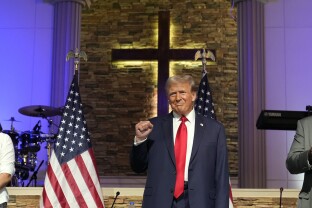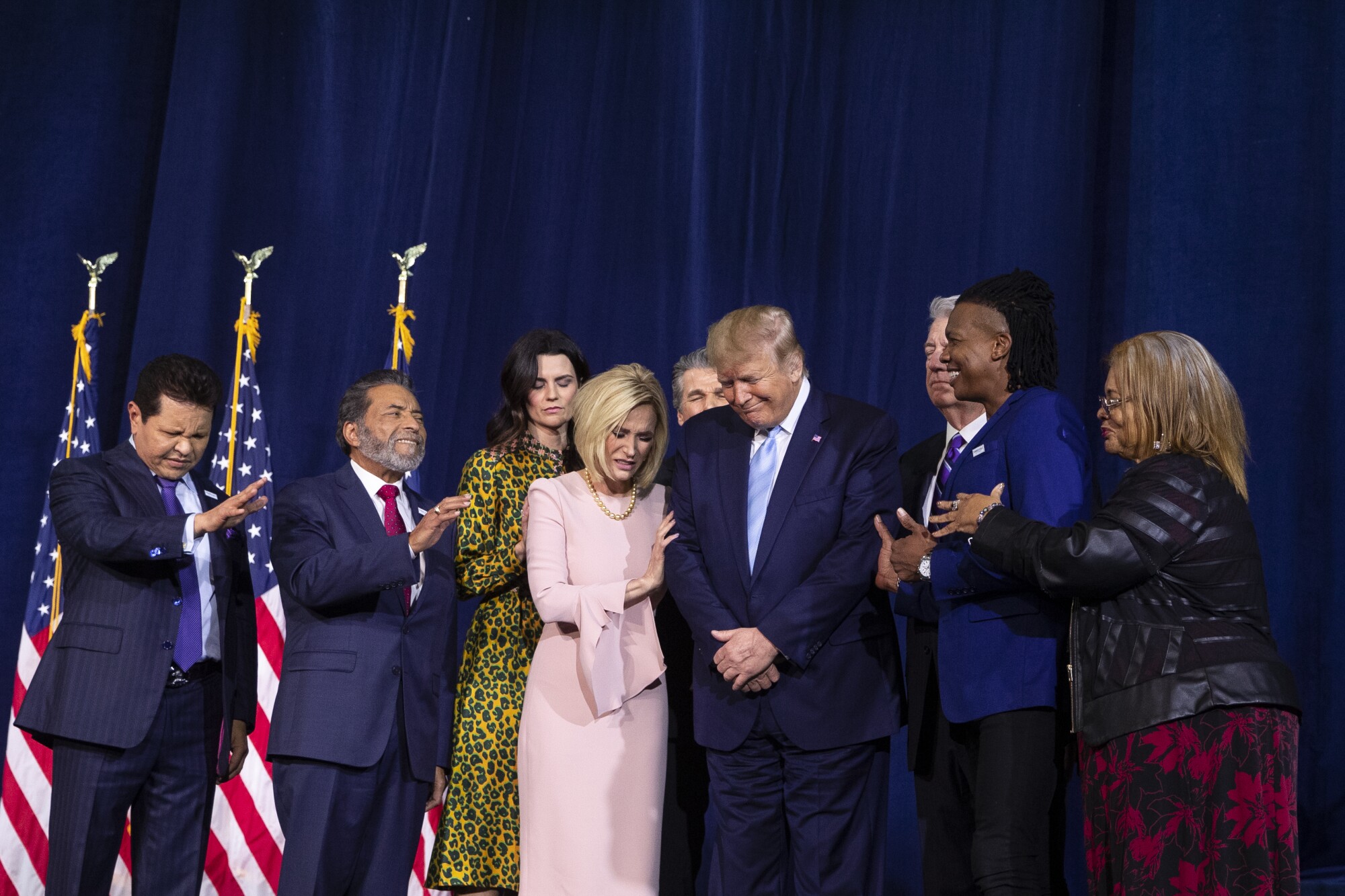Christian conservatives are keeping a close eye on the Republican Party as it prepares to ratify its platform this week.
Many have rallied behind Trump after an assassination attempt on Saturday. But Trump’s actions to shift the GOP away from traditional faith-focused policies have been a source of dismay. The maxim “Hold your nose and vote for Trump,” which many Christians followed in 2016 and 2020, may not be enough this time around, faith leaders and activists warn.
“A lot of people feel politically homeless right now. They feel so betrayed by the Republican Party, and honestly, they feel betrayed by Trump because of the things that he’s been saying about life in the womb,” Abby Johnson, a prominent anti-abortion Christian activist, told NOTUS. She added that based on conversations she has had with “thousands” of people across the country, “there’s a lot of people that are going to sit [the election] out, and that’s really unfortunate.”
Many Christians aren’t happy with Trump shifting the Republican Party’s decades-old position on abortion, an issue that earned their loyalty when he first ran in 2016. The latest platform doesn’t mention an opposition to same-sex marriage at all. And it cut any reference to support for the Ten Commandments or the United States’ “Judeo-Christian heritage.”
“The gap is there,” Albert Mohler, president of Southern Baptist Theological Seminary, told NOTUS. “We’re about to find out where the GOP is going on this and where Donald Trump is going on this. He must have overwhelming evangelical Christian support. And he better remember that.”
The attempt on Trump’s life brought some breathing room. The former president, who isn’t particularly religious, said on Truth Social that “it was God alone” who allowed him to survive the shooting — a claim that Christian conservatives seemed to agree with.
Mohler, for example, wrote in a column concurring with Trump’s post that “[i]ndeed, it was God and God alone, for God alone is the sovereign ruler of the cosmos.”
“I dare to ask, how do you look at yesterday’s events in Butler, Pennsylvania, and see it all merely as a lucky miss? If that’s all there is to it, our luck will one day run out. Thank God that day was not yesterday,” Mohler said.
Religious voters played a pivotal role in first getting Trump elected, and their support partly relied on his running mate, Mike Pence, a born-again Christian.
“I think in 2016 [Trump] knew his vulnerabilities,” said Marc Short, a longtime aide to Pence and his former chief of staff. “Partnering with Pence gave assurances to a lot of Christian conservatives. And I think today he sort of assumes they have nowhere to go and perhaps takes their support for granted.”
Short said this is likely because many Christian conservatives still think Trump is a better choice than President Joe Biden, citing his support for abortion and transgender rights.
“I think one thing that benefits Trump is that [the Biden] administration has been so antagonistic toward evangelicals’ worldview that … it affords Trump the luxury of them not having other places to go,” Short said. “It’s hard to see how even if you’re uncomfortable with Trump’s candidacy, you feel like you’d be welcome over there.”
Pence’s think tank, Advancing American Freedom, led a coalition of over 20 conservative groups in sending a letter to RNC delegates to urge them to restore the platform’s language calling for a constitutional amendment and federal legislation to restrict abortion.
“For the first time in decades, the Republican Platform retreats on life. Pro-life Americans are rightly outraged and gravely concerned,” the letter reads. “Since the Reagan Revolution, the party has spoken with unambiguous voice — Republicans stand for life. Today, that promise has been watered down and ultimately compromised.”
Support for Trump among Christian conservatives has always been bolstered by his promises to defend their faith and its key political tenets. They delivered votes, and he delivered three conservative justices to the Supreme Court who overturned Roe v. Wade, a monumental win for Christian conservatives.
But among Christians there has always been “anguished reservations and concerns about President Trump’s character and conduct,” Andrew Walker, an anti-abortion advocate and ethics professor at SBTS, told NOTUS.
“Even while I can appreciate so much about what President Trump accomplished in his first term, there will always be pause and hesitation from seeing President Trump as ‘one of us. He’s not,” Walker said, adding that he prays the assassination attempt would “grip his heart to live for God.” “Even while evangelical Christians have their reservations, we can say this while extending gratitude for the many positive things his administration delivered on.”
“His relationship with conservative Christians was transactional,” he added. “That has its benefits and its consequences, of course.”
The recent tension between Trump and Christian conservatives has focused on abortion and reproductive health. June’s Southern Baptist Convention saw attendees pass a nuanced, nonbinding resolution that opposed in vitro fertilization policies in America. Trump, who delivered recorded remarks to many attendees during a Danbury Institute event earlier in the week, had quickly defended IVF when an Alabama Supreme Court ruling temporarily threatened the procedure in the state.
As anti-abortion Christian leaders consider how to approach IVF, the next frontier beyond Roe, Trump is moving in the other direction, hoping a more moderate stance on abortion will earn him extra votes in November.
Trump “had no history of allegiance to social conservative concerns whatsoever,” said Brad Littlejohn, a fellow for the conservative religious think tank Ethics and Public Policy Center. “So him suddenly discovering a conscience on those issues” was an obvious electoral strategy in the past.
Some Christian activists have expressed alarm that Trump is dragging fellow conservatives further left. Sens. J.D. Vance and Marco Rubio, front-runners to be Trump’s running mate, have previously supported federal restrictions on abortion. But before the platform was approved, they quickly fell in line with the watered-down language.
“Donald Trump is the pragmatic leader here. He’s saying most abortion policies are going to be decided by the states,” Vance said on NBC earlier this month.
“Our platform has to reflect our nominee,” Rubio said on CNN the same day.
Was he worried that could impact grassroots voters?
“Not really. Because I don’t think there’s much of an option here,” Rubio said.
Some other lawmakers have dismissed the changes altogether.
The GOP platform “doesn’t matter,” Sen. John Kennedy said. “Do you know of anybody who’s ever sat down and read a party platform?”
The changes to the platform have not gone over smoothly with other members of the party who argue that the GOP should not shy away from its religious ties.
“First of all, religious voters — evangelicals, Catholics, conservative Jews — they’re our foundational votes, just a star coalition,” Sen. Josh Hawley, who recently advocated for Christian nationalism at the National Conservatism Conference, told NOTUS. “Republicans ought to think to themselves, ‘Well, what are the principles we want to stand on?’ And I think life and marriage, the value of religion are important, and historically always have been for the party.”
Republicans used to be much more forceful about their religious influence. In 2012, Republican pushback over Democrats removing the word “God” from their platform was so strong that the party added it back.
Sen. Kevin Cramer said removing the Christian affirmations from the Republican platform was “completely unnecessary” and “unfortunate.” But ultimately, he said Republicans would not focus on criticizing it the way they did with Democrats over a decade ago because the “binary choice in politics” and “the divide taking place right now in the Democratic Party” are leading the current political conversation.
But the platform’s text and approval process — and what they symbolize — are significant to activists who see the platform as a way to hold party leaders accountable for their promises. Tony Perkins, president of the Family Research Council, condemned how the platform — written by Trump allies — was adopted, calling it “unbecoming of a party that champions free speech and due process” because delegates were not allowed proper debate or an amendment process.
One activist who was outside the room where the Republican National Committee’s Platform Committee was meeting told NOTUS, “The process was just bastardized.”
Some of the people who led the RNC Platform Committee, such as Russ Vought and Ed Martin, have expressed strong Christian beliefs. While Trump critics argue that Trump’s public stances don’t matter because he’d be surrounded by staunch conservatives, former Trump officials suggest that he has such a grip on the GOP that his allies will fall in line on even their deepest convictions.
Vought, for example, is “very sincere in his faith,” Short told NOTUS. But even so, “he has to come to grips with the changes they made on life.”
—
Oriana González is a reporter at NOTUS. Ben T.N. Mause is a NOTUS reporter and an Allbritton Journalism Institute fellow.
Sign in
Log into your free account with your email. Don’t have one?
Check your email for a one-time code.
We sent a 4-digit code to . Enter the pin to confirm your account.
New code will be available in 1:00
Let’s try this again.
We encountered an error with the passcode sent to . Please reenter your email.



